

Dunning–Kruger effect. Cognitive bias about one's own skill The Dunning–Kruger effect is a hypothetical cognitive bias stating that people with low ability at a task overestimate their own ability, and that people with high ability at a task underestimate their own ability.
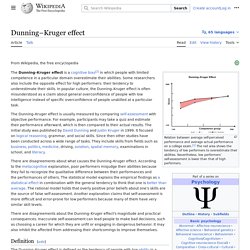
As described by social psychologists David Dunning and Justin Kruger, the bias results from an internal illusion in people of low ability and from an external misperception in people of high ability; that is, "the miscalibration of the incompetent stems from an error about the self, whereas the miscalibration of the highly competent stems from an error about others".[1] It is related to the cognitive bias of illusory superiority and comes from people's inability to recognize their lack of ability.
Without the self-awareness of metacognition, people cannot objectively evaluate their level of competence. Original study[edit] Later studies[edit] Mathematical critique[edit] Paired measures[edit] Cultural differences in self-perception[edit] Illusion of superiority. Anomaly Hunting. There are numerous ways in which thought processes go astray, leading us to false conclusions, even persistent delusions.
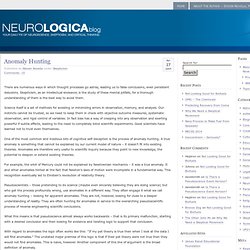
Skepticism, as an intellectual endeavor, is the study of these mental pitfalls, for a thorough understanding of them is the best way to avoid them. Science itself is a set of methods for avoiding or minimizing errors in observation, memory, and analysis. Our instincts cannot be trusted, so we need to keep them in check with objective outcome measures, systematic observation, and rigid control of variables. In fact bias has a way of creeping into any observation and exerting powerful if subtle effects, leading to the need to completely blind scientific experiments. Good scientists have learned not to trust even themselves. One of the most common and insidious bits of cognitive self-deception is the process of anomaly hunting. For example, the orbit of Mercury could not be explained by Newtownian mechanics – it was a true anomaly.
Richard Hoagland Conclusion. List of cognitive biases. Systematic patterns of deviation from norm or rationality in judgment Cognitive biases are systematic patterns of deviation from norm and/or rationality in judgment. They are often studied in psychology, sociology and behavioral economics.[1] Although the reality of most of these biases is confirmed by reproducible research,[2][3] there are often controversies about how to classify these biases or how to explain them.[4] Several theoretical causes are known for some cognitive biases, which provides a classification of biases by their common generative mechanism (such as noisy information-processing[5]).
Gerd Gigerenzer has criticized the framing of cognitive biases as errors in judgment, and favors interpreting them as arising from rational deviations from logical thought.[6] Explanations include information-processing rules (i.e., mental shortcuts), called heuristics, that the brain uses to produce decisions or judgments. List of memory biases. In psychology and cognitive science, a memory bias is a cognitive bias that either enhances or impairs the recall of a memory (either the chances that the memory will be recalled at all, or the amount of time it takes for it to be recalled, or both), or that alters the content of a reported memory.
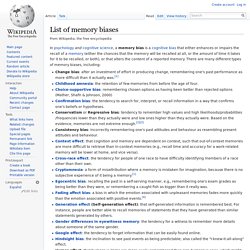
There are many different types of memory biases, including: See also[edit] [edit] ^ Jump up to: a b c d e Schacter, Daniel L. (1999). "The Seven Sins of Memory: Insights From Psychology and Cognitive Neuroscience". Cognitive dissonance. In psychology, cognitive dissonance is the mental stress or discomfort experienced by an individual who holds two or more contradictory beliefs, ideas, or values at the same time, or is confronted by new information that conflicts with existing beliefs, ideas, or values.[1][2] Leon Festinger's theory of cognitive dissonance focuses on how humans strive for internal consistency.

When inconsistency (dissonance) is experienced, individuals tend to become psychologically uncomfortable and they are motivated to attempt to reduce this dissonance, as well as actively avoiding situations and information which are likely to increase it.[1] Relationship between cognitions[edit] Individuals can adjust their attitudes or actions in various ways. Adjustments result in one of three relationships between two cognitions or between a cognition and a behavior.[1] Cognitive dissonance. Confirmation bias. Tendency of people to favor information that confirms their beliefs or values Confirmation bias, also known as myside bias, is the tendency to search for, interpret, favor, and recall information in a way that confirms or supports one's prior beliefs or values.[1] People display this bias when they select information that supports their views, ignoring contrary information, or when they interpret ambiguous evidence as supporting their existing attitudes.
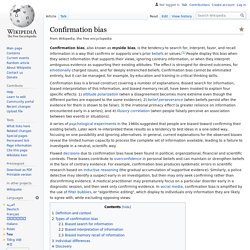
The effect is strongest for desired outcomes, for emotionally charged issues, and for deeply entrenched beliefs. Confirmation bias cannot be eliminated entirely, but it can be managed, for example, by education and training in critical thinking skills. Confirmation bias is a broad construct covering a number of explanations. A series of psychological experiments in the 1960s suggested that people are biased toward confirming their existing beliefs. Definition and context[edit] Confirmation biases are effects in information processing. Confirmation bias. Confirmation bias refers to a type of selective thinking whereby one tends to notice and to look for what confirms one's beliefs, and to ignore, not look for, or undervalue the relevance of what contradicts one's beliefs.
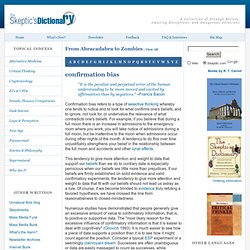
For example, if you believe that during a full moon there is an increase in admissions to the emergency room where you work, you will take notice of admissions during a full moon, but be inattentive to the moon when admissions occur during other nights of the month. A tendency to do this over time unjustifiably strengthens your belief in the relationship between the full moon and accidents and other lunar effects. This tendency to give more attention and weight to data that support our beliefs than we do to contrary data is especially pernicious when our beliefs are little more than prejudices. Subjective validation. Confirmation bias. From Citizendium, the Citizens' Compendium.
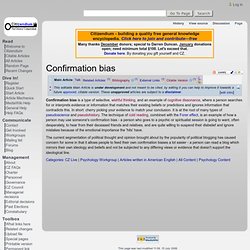
Cognitive traps for intelligence analysis. From Citizendium, the Citizens' Compendium Intelligence analysis is fraught with a host of general cognitive traps that appear in many disciplines, but also to a set of cognitive traps common to intelligence analysis.
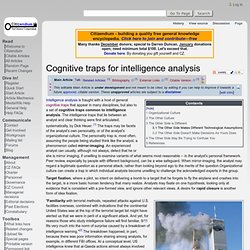
The intelligence traps that lie between an analyst and clear thinking were first articulated, systematically, by Dick Heuer. [1] The traps may be facets of the analyst's own personality, or of the analyst's organizational culture. The personality trap is, most often, assuming the people being studied think like the analyst, a phenomenon called mirror-imaging. An experienced analyst can usually, although not always, detect that he or she is mirror imaging, if unwilling to examine variants of what seems most reasonable -- in the analyst's personal framework. Peer review, especially by people with different background, can be a wise safeguard. The cost of forgetting the familiar Organizational Culture The Other Culture.